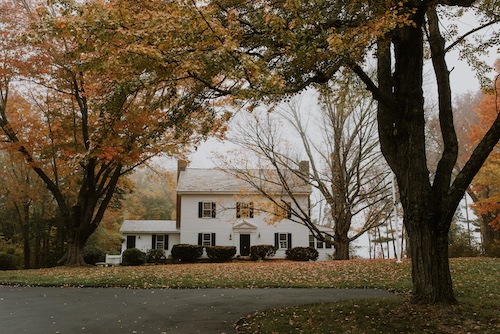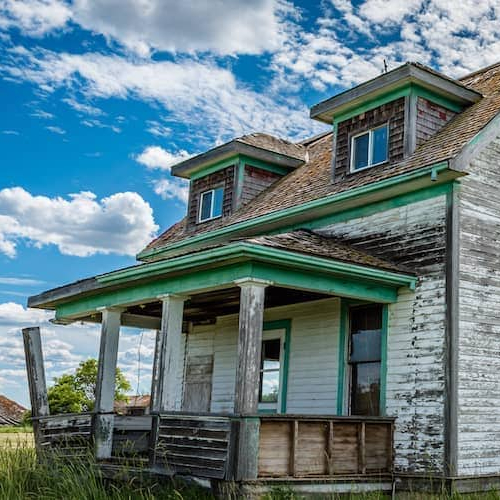What is a zombie foreclosure
Jun 18, 2024
•4-minute read

You’ve heard of a zombie apocalypse, but what about a zombie foreclosure? While it might not have you running for the hills in a panic, a zombie foreclosure can still have undesirable consequences. You’re probably already familiar with the sight of one. A house that looks abandoned, with overgrown vegetation and chipped paint. There seems to be nobody living in the home, with no efforts to get the house back on the market.
This happens when a homeowner defaults on the mortgage and leaves immediately. We'll explain some of the negative effects it can have on homeowners and surrounding properties and share tips on how to steer clear of these issues.
Zombie foreclosure definition
So, what are zombie foreclosures?
A zombie foreclosure refers to a situation in which a homeowner vacates their property after receiving a notice of mortgage default. Basically, they’re expecting they’ll lose the home in the pending foreclosure and they leave before the foreclosure has been finalized.
What many homeowners fail to realize is that the foreclosure may get canceled for any number of reasons. This means the house title will remain with the homeowner, who may not even know they still own the home. The problem? They’re still financially responsible for it.
Why is it called a zombie foreclosure?
Like its namesake, the house is essentially dead. With no one around to maintain general upkeep, the house will often grow more decayed and decrepit over time. Its mere presence can continue to cause harm to its former owners and the community around it.
How do foreclosed properties become zombie homes?
Homes usually become zombie properties because of a misunderstanding of the foreclosure process. If a borrower believes their home to be lost, they might pick up and leave during preforeclosure and never come back.
In the typical foreclosure process, ownership of the home is transferred to the mortgage lender, who then completes the foreclosure process on the property. Sometimes, though, the lender may decide not to go through with the foreclosure.
In some cases, the lender or bank doesn’t want to take on the financial responsibilities of repairs or back taxes owed. No matter the reasons, the lender has no obligation to let the previous owner know that they still hold the title to the home.
If the homeowner is unaware of the failed foreclosure, they’re then the owner of a zombie title that can come back and bite them financially.
How zombie homes can hurt homeowners and neighborhoods
Abandoning your home doesn’t absolve you of your responsibilities, financial or otherwise. If you’ve moved on to another house or town, your former home can continue to haunt you in several ways.
For example:
- You may still owe unpaid property taxes, which could result in a tax lien.
- A homeowners association (HOA) could file a lawsuit over unpaid HOA fees.
- You could still receive a bill for maintenance, upkeep, trash removal and other services.
- You can accrue fines for your property inadvertently violating zoning laws.
These consequences can result in a major hit to your credit score, among other financial and legal implications. This could prevent you from moving on with your life and regaining your financial footing.
You could also be negatively impacting your former neighborhood. Abandoned homes can fall into disrepair and affect the surrounding property values.
A vacant property can become a shelter for squatters and attract vandalism or other crimes. This could drive away potential new residents and force current ones to reconsider whether their neighborhood is still safe to live in.Can you prevent a zombie foreclosure on you home?
The best way to prevent a zombie foreclosure is to avoid foreclosure by making on-time mortgage payments.
That said, if you’re in the preforeclosure process, it’s important to understand that once the foreclosure notice is sent, there’s a mandated waiting period. During this period, the homeowner can pull the house out of foreclosure by paying a large lump sum.
Or, if your home goes into the foreclosure process, you can still avoid foreclosure with a deed in lieu agreement. It’s not always the end-all that people think it is.
If all else fails and you foresee losing your home to foreclosure, you should stay in your house until you receive an official notice to vacate the premises. This way, you can remain in communication with your lender and be notified when the title of the property has been transferred out of your name.
As an extra precaution, you may want to confirm you no longer own the property. You can do this by visiting your county recorder’s office or website.
Steps to buy a zombie house
Buying a foreclosed home is common among home buyers and real estate investors alike. These homes are often sold at significantly reduced prices, and sellers tend to be more motivated to sell.
However, buying a zombie foreclosure can involve a few extra steps. Because of title discrepancies and other legal ramifications, you might want to consider working with a real estate attorney. You may even need to file a lawsuit to obtain ownership.
Fortunately, finding zombie properties these days is easier than it used to be with more accurate property data systems.
Consider reaching out to the following entities for information on a zombie property:
- The lender or bank: Lenders usually keep a list of foreclosure properties in their areas, and it stands to reason they’d keep files on zombie foreclosures as well.
- The property management company: The zombie property in question may also be associated with a property management company. You should contact them to learn any important information regarding the property.
- The previous owner: If you can find the former owner's name and contact information in your county’s public records, consider contacting them about purchasing the property.
Real estate terms similar to zombie foreclosure
Zombie foreclosure isn’t the only ghoulish and mysterious term related to real estate. Let’s examine some other common but possibly intimidating terms.
Zombie foreclosure vs. shadow inventory
A shadow inventory refers to foreclosure properties owned by the bank and intended for sale on the housing market. Until it’s officially for sale, the property is considered shadow inventory or “hidden in the shadows.”
Zombie foreclosure vs. vampire foreclosure
A home can become a vampire foreclosure when the previous owner continues to reside in the house even after a completed foreclosure. Vampire foreclosures are even more common than zombie foreclosures, believed to occur in around 47% of bank-owned homes around the United States.
The bank hasn’t tried to remove the former owner or sell the property, and the previous owner will continue to live in the home undisturbed. This could happen for the following reasons:
- The bank is trying to avoid the cost of maintaining the property themselves.
- The homeowners believe they were improperly foreclosed upon and are fighting that decision in court.
The biggest problem with vampire foreclosures is that the home will eventually need to reenter the housing market. At some point, the bank will want to sell the property, and when it does, the original homeowner will be forced to leave immediately.
It also means that home prices in certain areas are artificially driven up because of a perceived “lack of inventory.” In reality, there are plenty of homes for prospective home buyers to choose from – they're just vampire homes.
The bottom line: Stay in your house to avoid a zombie foreclosure
Zombie foreclosures may not refer to the walking dead, but they can be just as scary for homeowners and communities. You should try everything in your power to avoid letting your home turn into a zombie house. The best way to do this is to remain in the house throughout the foreclosure process.
Learn about how to avoid the foreclosure process to better understand the financial impacts of defaulting on a mortgage.

Carla Ayers
Carla Ayers is former section editor for Rocket Homes and is a Realtor® with a background in commercial and residential property management, leasing and arts management. She has a Bachelors in Arts Marketing and Masters in Integrated Marketing & Communications from Eastern Michigan University.
Related resources
6-minute read
What does a title company do?
A title company is a third party that works on behalf of both the lender and the buyer. Learn more about what title companies do in the home buying process.
Read more

5-minute read
Distressed property: Everything you need to know
A distressed property is a house that’s on the verge of foreclosure or has been reclaimed by a lender. Learn more about investing in distressed homes h...
Read more
6-minute read
What is adverse possession in real estate?
Adverse possession can give trespassers the legal right to claim ownership of your property. Learn more about adverse possession and how to prevent it.
Read more